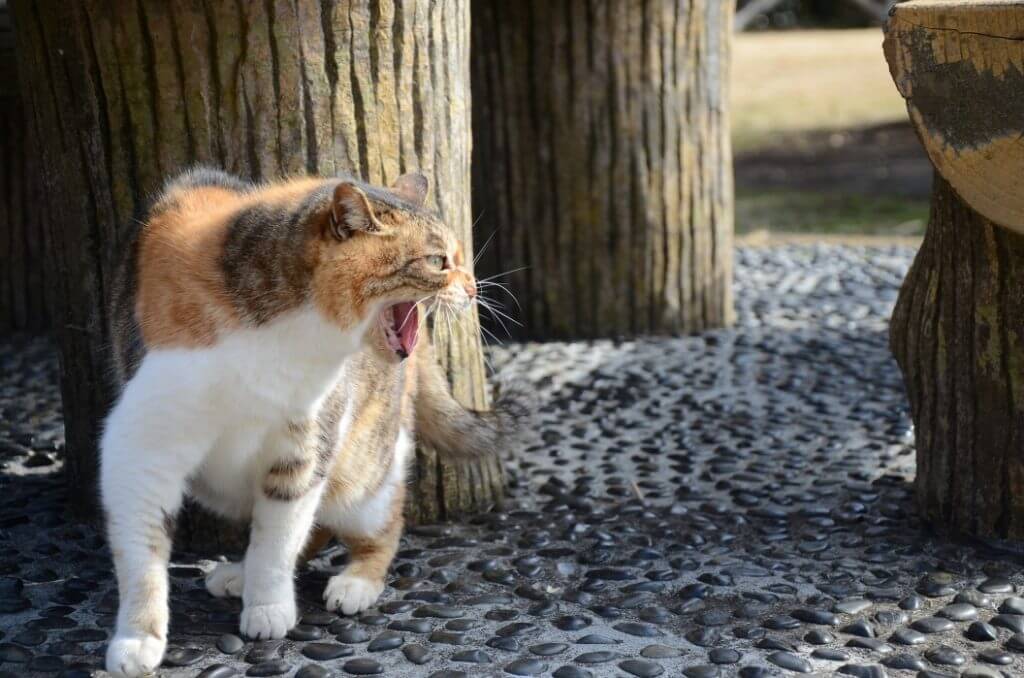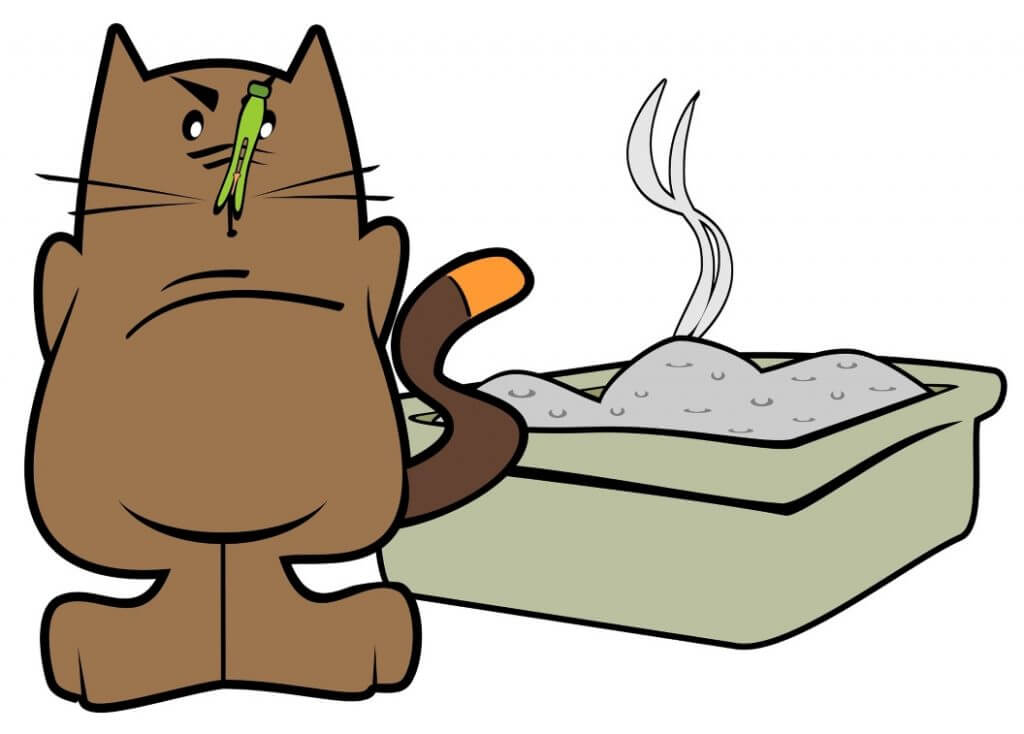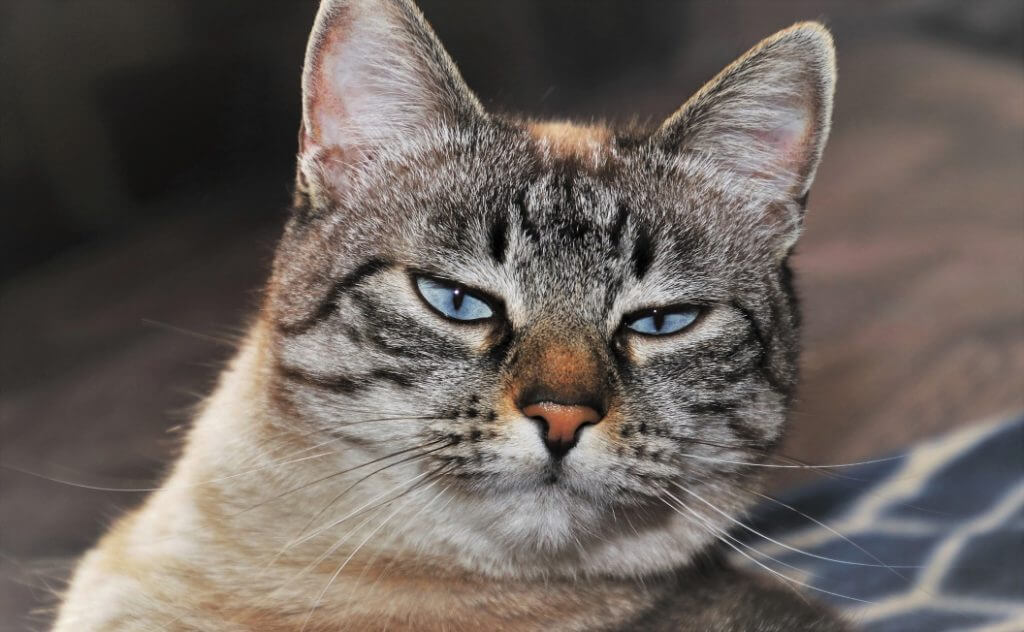This post may contain affiliate links. You can view our affiliate disclosure here.

When male cats spray (also known as urine marking), it’s usually a way for them to communicate with each other when it comes to marking territory or boundaries.
They do this by releasing small amounts of urine, usually on vertical surfaces like walls. They can also release urine on the floor or even defecate. This is experienced mostly with male cats, although female cats are also known to mark their territory through spraying as well.
This is a big nuisance, indoors as well as outdoors. Not only is spray difficult to get out of materials, but it smells really bad too.
It’s important that you be able to make the distinction between spraying and normal urination. Urinating involves cats squatting and releasing a large amount of urine on the ground, while spraying involves a cat standing upright and spraying a small amount on vertical surfaces like walls, doors, chairs, and furniture.
If you are unsure what your cat is doing, we recommend talking to a veterinarian about the problem before moving forward with treatment.
When do male cats start spraying?
There is a thrill that comes with watching your kitty learn how to walk, leap, meow and use their claws for the very first time. Kittens grow fast, and since it’s in their nature to be territorial, you may find yourself struggling with cat spray even when he’s still very young.
On average, male kittens are known to start spraying at the age of six months, when they reach sexual maturity. In some cases, cats do spray even before hitting six months, with some starting at four to five months.
If your male cat is six months old and starts yowling and meowing more than usual, chances are he’s seeking out a mate. However, if he moves around and occasionally moves out of the house, there’s a good chance that he’s preparing to spray.
Reasons Why Male Cats Start Spraying
1. Stress & Anxiety
Cats like to feel in control. If they are feeling anxious or stressful, they can spray; this helps them feel more confident.
Cats do not like rapid changes in lifestyle or routine—if you alter their “normal” lifestyle, you may see them marking their territories using urine.

If you think stress or fear is causing your cat to spray, chances are there is a competitive cat in the neighborhood.
2. Not Enough Litter Boxes
It is always good to have one more litter box than the number of cats you have. If you have just one cat, have at least two placed in a quiet place where it won’t be interrupted or startled when doing its business.
3. Illness
If you see that your cat has suddenly changed behavior and has started messing around, it is always good to check if everything is okay with their health.
An underlying medical condition such as interstitial cystitis can cause problems. This may make your cat pee outside the litter box.
If you see anything out of the ordinary, check with your vet before taking any action.
4. Litter Box Preferences

If your cat doesn’t like its litter box or has trouble accessing it, he may start to spray around. There are a few reasons why a cat may not use the litter box, including:
- The litter box is too high above the ground, making it difficult for the cat to access.
- The litter box is too dirty. Cats are sensitive to cleanliness, and if their box is dirty, they often won’t use it.
- You keep shifting the litter box or it is not always available. In this case, your cat may not “hold it” for long and may be forced to spray.
Do male cats spray after being neutered?

A male cat can continue spraying for approximately 5 to 6 six months after being neutered. This is because of the remaining testosterone in your cat’s system.
90% of all cats that have been fixed will stop spraying after being neutered.
In some instances, cats will continue spraying even after being neutered. This can indicate that the cat has gotten into the habit of spraying from a young age. It can also indicate that there is an underlying problem such as stress or a urinary tract infection.
Final Thoughts
It is always good to make your cat feel safe and loved, because regardless of your intentions, if he feels anxious, he may spray as a way of communicating or making boundaries.
Apart from having your cat neutered, have the vet check for any liver infection, urinary tract infection, feline leukemia, or any other health complications that may be causing your cat to spray.
Thanks for reading this article! Do you have an issue with your male cat spraying? What have you done to try and stop it? Feel free to share your experiences in the comments.



